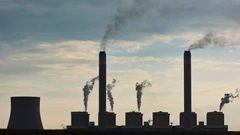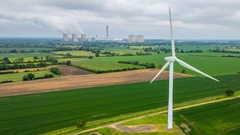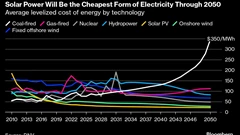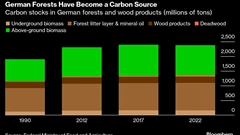Double-Punch Storms Thrust Climate Into the US Presidential Race
(Bloomberg) -- Back-to-back, catastrophic strikes by Helene and Milton in the southeastern US are reshaping the presidential race, putting climate disasters front and center in the final stretch of Vice President Kamala Harris and former President Donald Trump’s dueling campaigns.
In interviews and speeches, on the campaign trail and on social media, Harris, the Democratic nominee, and Republican Trump are increasingly talking about the same thing — hurricanes and disaster response — in very different ways.
Disasters became a major campaign focus with Helene, which made landfall Sept. 26 in Florida’s Big Bend region as a Category 4 storm before unleashing historic rainfall inland that triggered deadly flooding, especially in western North Carolina. In the storm’s wake, Harris and Trump rejiggered their travel schedules to visit affected communities, and they’ve increasingly been talking about recovery efforts.
The threat of Milton, another monster hurricane that hit Florida Wednesday night as a Category 3 storm, only intensified the candidates’ attention on the issue.
Trump has used the twin disasters to attack Harris and President Joe Biden over their response, and has spread misinformation about it on his social media site Truth Social as well as in interviews and rally speeches. Trump wrongly claimed that disaster relief funding is being redirected to migrants and that hurricane victims can only get $750 in aid. He also claimed without evidence that the relief effort is neglecting Republican communities.

Meanwhile, Harris is spending much of her time talking about hurricane preparedness, response and relief. The issue came up when she appeared on the ABC daytime talk show . She pushed back on some of Trump’s baseless claims about the administration’s post-Helene relief efforts. She later called into The Weather Channel to counter more hurricane misinformation. (Karoline Leavitt, a Trump campaign spokeswoman, told Bloomberg News, “The only misinformation is coming from the Harris-Biden Administration.”)
The Harris campaign also dropped a new ad attacking Trump’s handling of past disasters when he was president. It spotlights the map of Hurricane Dorian’s track in 2019 that Trump notoriously altered with a Sharpie — a saga that came to be known as Sharpiegate. The ad features interviews with two former Trump officials calling out his storm response. “He would suggest not giving disaster relief to states that hadn’t voted for him,” Kevin Carroll, who was senior counsel to former Homeland Security Secretary John Kelly, says in the ad.
Overwhelming scientific evidence shows climate change is making hurricanes more powerful, causing them to intensify more rapidly and infusing them with more rain.
Harris hasn’t dwelled on the link between the storms and global warming. And up to this point, she hasn’t made climate a cornerstone of her election pitch, despite the significant climate legacy of the Biden administration and many Democrats saying global warming is among their top voting priorities. In her Democratic National Convention speech, she only briefly touched on the issue. In the debate with Trump, she gave Biden’s green initiatives a short mention before touting US oil and gas production. Trump, who in the past called climate change a “hoax,” has vowed to gut Biden’s climate policies while belittling clean energy technologies such as wind power and electric vehicles.
Both candidates are now talking about climate change even if they aren’t using those words, says Pete Maysmith, senior vice president of campaigns for LCV Victory Fund, on the election-related side of the League of Conservation Voters.
“I think sometimes there’s this view that we need these magic words to be uttered or else we’re not talking about climate change,” says Maysmith. “Of course we’re talking about climate change.” (In a similar vein, he argues that Harris had already been talking about it in comments she made on wind energy, solar power, car batteries and more.)
Environmental groups have followed the Harris campaign’s lead on how to bring up climate with voters, focusing their ad buys and other voter education efforts on how federal climate spending is creating new jobs and bringing down energy costs generally, rather than detailing the policy specifics. And they’re now taking her cue by messaging around the hurricanes.
LCV Action Fund recently released a short video on Instagram that shows images and footage of Helene’s damage with a voiceover of Trump saying: “When people talk about global warming, I say the ocean is going to go down 100th of an inch within the next 400 years. That’s not our problem.” (Trump has made versions of this claim in campaign rallies and TV interviews.) The video has raked in more than 4 million views, in part because American musician Billie Eilish reposted it.
The advocacy group Climate Power released a video with rapper Big Freedia on Thursday highlighting how Project 2025 — a conservative wish list for a second Trump presidency that Trump himself has disavowed — proposes to privatize the National Weather Service, which issues alerts that Americans have been relying on to stay safe during Helene and Milton.
“The fact that Hurricane Milton morphed into such a powerful storm in such a short amount of time shows the climate crisis is here, and shows through a very clear lens the cost to people — in lives lost, in loss of homes, in loss of businesses,” says Alex Glass, communications director at Climate Power.
(Corrects LCV Action Fund to LCV Victory Fund in tenth paragraph.)
©2024 Bloomberg L.P.
KEEPING THE ENERGY INDUSTRY CONNECTED
Subscribe to our newsletter and get the best of Energy Connects directly to your inbox each week.
By subscribing, you agree to the processing of your personal data by dmg events as described in the Privacy Policy.
More renewables news

Northvolt Founder’s Next Big Green Bet Has a Power Problem

Project Dearth Slows S. Africa’s $9.3 Billion Coal Exit Plan

EDF Seeks to Raise Up to £4 Billion to Help Fund Construction of UK’s Hinkley Nuclear Plant

UK Rolls Out Funding for Projects to Store Renewable Power

Global Emissions Likely Have Peaked as Renewables Take Hold

Germany’s Forests Become Carbon Source After Years of Damage

GIC Is Said to Weigh Selling $5 Billion Stake in India’s Greenko

TotalEnergies signs a renewable electricity supply agreement with Saint-Gobain

Equinor acquires a 9.8% minority stake in Ørsted
















